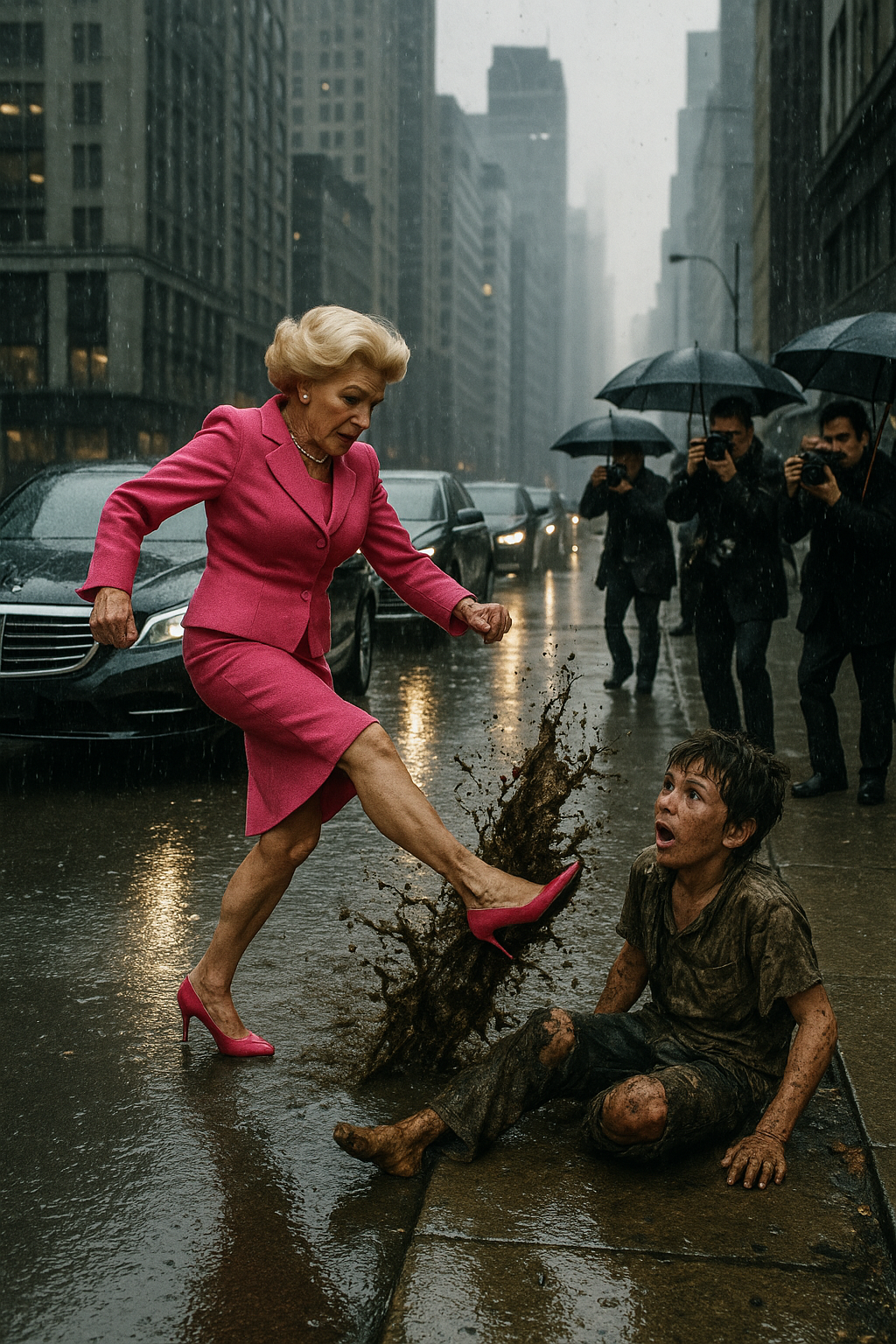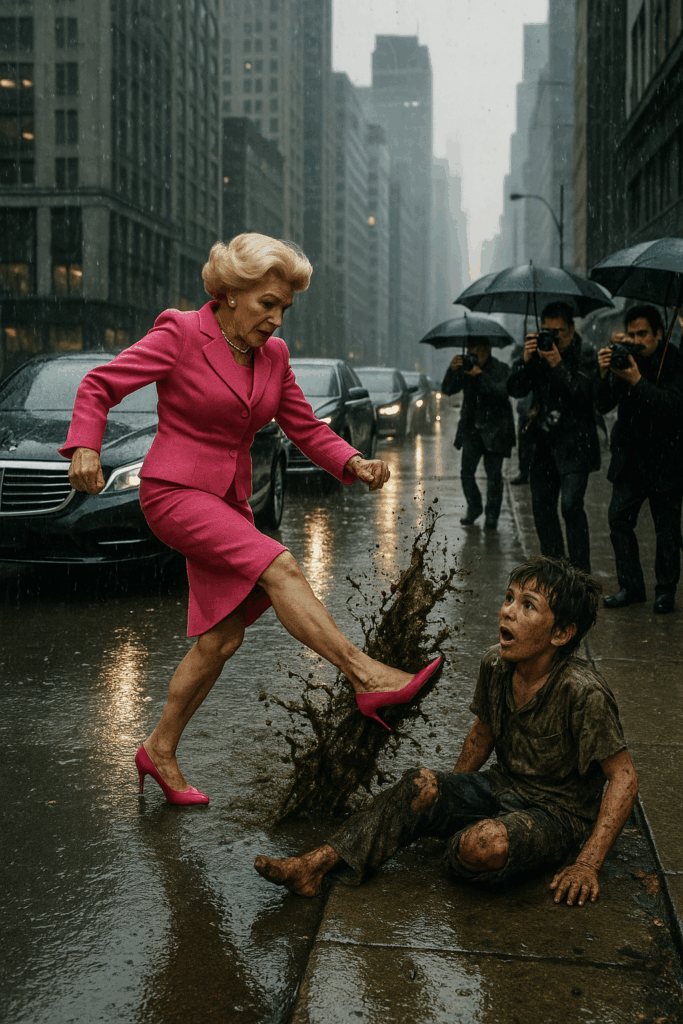The rain had been falling for hours, washing the city of Marseille in streaks of silver and shadow. It was the kind of rain that blurs faces, softens edges, and makes even the strongest hearts ache. For Isabelle Fontaine, however, the storm was nothing compared to the one she carried inside.
Five years had passed since her world had ended — the day her only son, Eliott, vanished from their garden without a trace. He’d been four years old, wearing a blue raincoat and holding a toy airplane. The police had found the coat, later, floating near the docks. But not him. No ransom. No footprints. Just emptiness.
In the years that followed, Isabelle transformed grief into something the world could admire. She built Fontaine Luxe, a fashion empire that clothed the rich and famous — a kingdom woven from silk, perfection, and control. Every deal signed, every headline won, every gala appearance… all of it kept her from remembering the sound of her son’s laugh.
She learned to silence the memory with power.
The Woman Who Forgot How to Feel
On a gray afternoon in late November, Isabelle stepped out of her black car in front of Maison Éclat, the kind of restaurant where the city’s elite whispered secrets over champagne and oysters.
She wore a crisp white suit, her blonde hair pinned in a flawless twist, her diamond watch glinting against the drizzle. People turned to look. She was elegance incarnate — a woman who never broke, never stumbled, never bled.
Inside, her assistant trailed behind her, tablet in hand.
“Your lunch meeting with the investors has been pushed to one,” she murmured.
Isabelle nodded, distracted. The rain outside thickened, smearing the glass with shifting silver. She’d been here a thousand times, but something about that day — the storm, the restless weight in her chest — felt different.
When the meeting ended, she left the restaurant through the front entrance, her heels clicking sharply against the wet pavement. A line of guests waited by the door, umbrellas huddled like petals around them.
That’s when it happened.
A blur of motion darted across the sidewalk — a small boy, no older than nine, soaked through, clutching a crumpled paper bag. His shoes slapped against the puddles as he tried to run past her.
But he slipped.
Cold, muddy water splashed across her white suit, staining the silk like ink on snow.
Gasps rippled through the crowd.
Isabelle froze. Then, slowly, she turned her gaze on him.
The boy looked up, shivering, his face smeared with dirt, his hair plastered to his forehead. “I—I’m sorry, ma’am,” he stammered. “I didn’t mean—”
“Do you have any idea what you’ve done?” she snapped. Her voice, once polished for boardrooms and charity galas, came out sharp and ugly. “This suit costs more than you’ll see in your life!”
Murmurs spread through the line. Someone lifted a phone, recording. The boy’s shoulders curled inward. “I just wanted the food,” he whispered. “They threw it away.” “Then maybe you should learn not to steal,” Isabelle said coldly. And before she knew it — before her mind could catch her hand — she shoved him.
The boy stumbled backward into the puddle with a splash.
For a second, the world seemed to stop. The rain, the whispers, the flicker of cameras — all of it froze. Isabelle stood there, heart hammering, chest tight. The boy blinked up at her, water dripping from his lashes. And that’s when she saw it. A faint, crescent-shaped birthmark, just above his right thumb. Her breath caught. The sound of the city faded. She knew that mark. She’d traced it a thousand times while her son slept — a tiny silver moon against his skin.

The Mark That Shouldn’t Exist
The boy scrambled up, clutching his bag of leftovers. “I’m sorry, ma’am,” he said again, voice trembling. “I only eat what people leave behind.” Then he turned and disappeared into the storm, swallowed by umbrellas and headlights.
Isabelle’s assistant was saying something — “Ma’am, are you alright?” — but the words barely reached her. Her hands were shaking.
“Cancel everything,” she said quietly. “Now.”
That night, Isabelle didn’t sleep. She sat by her window, staring at the rain-soaked city, replaying every detail — the boy’s eyes, his voice, the curve of that impossible mark. Her mind screamed logic: It’s a coincidence. But her heart whispered something else. By dawn, she was already on the move.
Isabelle called in every favor she’d ever been owed. Surveillance footage, police contacts, private investigators — the machine of her wealth spun into motion. At noon, one of her security heads called.
“We found the boy. He’s been seen near the docks, by the old train yard. Locals say he lives there with a group of street kids.”
Her pulse quickened. “Send me the address.”
By the time she arrived, the storm had passed. The air smelled of rust and seawater. The buildings loomed like ghosts, windows shattered, graffiti bleeding down the walls. She spotted him near a dumpster, crouched beside a stray dog, sharing a crust of bread.
For a long moment, she just watched.
His hands were small and scarred, his frame thin — but the way he moved, the way he tilted his head, the way his lips pressed together when thinking — it all pulled at something buried deep inside her. Then he turned, sensing her. Their eyes met.
“Hello,” Isabelle said softly.
He didn’t run. Just stared, wary.
“I’m not here to hurt you,” she said, stepping closer. “I just… wanted to talk.”
He studied her face. “You’re the lady from the restaurant,” he said finally. “The one who got mad.”
“Yes,” she whispered. “And I’m sorry for that.”
He shrugged, glancing at the ground. “People yell a lot. I’m used to it.”
“What’s your name?”
He hesitated. “Leo.”
“Leo,” she repeated, her throat tightening. “That’s a good name.”
He smiled faintly. “A lady at the church gave it to me.”
Ghosts in the Blood
Over the next few days, Isabelle visited the train yard again and again. She brought food, blankets, clothes. Slowly, Leo began to trust her. He told her bits and pieces — that he didn’t remember his real parents, that he’d been found wandering near the docks at four years old, that the only thing he’d had with him was a blue toy airplane.
The world tilted.
She reached for her bag with trembling fingers and pulled out an old photograph — her and Eliott in the garden, his tiny hand holding that same plane.
“Leo,” she whispered, “was it like this?”
His eyes widened. “That’s it,” he breathed. “I used to have one. I dropped it in the water.”
Her vision blurred. Tears spilled before she could stop them.
She didn’t tell him the truth immediately. Instead, she arranged for a DNA test, sending samples quietly through a private lab in Paris.The days that followed were torture. Every minute stretched like wire. Every sound reminded her of a laugh she’d lost. Then the call came.
“Madame Fontaine,” the voice said, hesitant. “The results are… a 99.9% match. The boy is your son.”
Her knees buckled. The world spun.
He was alive. All this time. But where had he been? Who had taken him? And why had no one come forward?
The Truth No Mother Should Hear
When Isabelle finally met with the detective she’d hired years ago, he arrived with a thin, sealed envelope. Inside were police reports — recently unearthed. The truth hit like a blade.
Eliott hadn’t been kidnapped by strangers. He’d been taken by her husband’s mistress, a woman he’d been planning to leave Isabelle for. The woman had fled Marseille with the boy, moving from place to place until she fell ill. When she died, Eliott — now Leo — had been left alone on the streets, forgotten by everyone except fate.
Isabelle’s hands shook as she read. The world, the empire, the years of rage — all of it felt meaningless.
She had built walls of power to protect herself from pain, and in doing so, had built a world where her son would have starved in her shadow. She found Leo again the next morning, sitting by the water with the dog curled against his legs.
When he saw her, he smiled — hesitant, gentle. She knelt before him. “Leo… I need to tell you something.”
He tilted his head. “You look sad.”
“I’ve been sad for a long time,” she whispered. “Because I lost my son. His name was Eliott.”
Something flickered in his eyes. She took a shaky breath and showed him the birth certificate, the photograph, the DNA results.
“I think you’re him,” she said. “I think you’re my boy.”
He stared at her for a long moment — then shook his head slowly. “My mom’s gone,” he said. “The lady who took care of me… she said my real mom didn’t want me.”
Isabelle’s heart broke anew. “She was wrong,” she said. “I looked for you every day.”
He studied her face, the tears she didn’t bother to hide.
Finally, he said, “You pushed me. That day. Why?”
The words struck like lightning.
“I forgot how to be kind,” she said quietly. “But I remember now. If you’ll let me, I want to make it right.”
He looked down at his hands — that small crescent mark gleaming under the light. Then, wordlessly, he reached out and took hers.
Months later, Isabelle withdrew from public life. She sold her company shares, closed her offices, and quietly funded a foundation for missing children. Reporters called it a “sudden act of charity.” None knew the truth — that it was the only way she knew how to atone.
Sometimes, she and Leo walked by the docks together. He loved the sea, though it frightened her still. He was cautious, watchful — old beyond his years — but sometimes he laughed, and in those moments, she caught glimpses of the boy she’d once held.
One afternoon, as gulls wheeled overhead, Leo asked softly, “If I hadn’t fallen that day… would you have found me?”
She didn’t answer right away. Finally, she said, “Maybe not. Maybe fate knew I needed to fall, too.”
Years later, long after the headlines had faded, a woman in white could sometimes be seen standing at the edge of the Marseille pier — not the ruthless business icon the world remembered, but a mother who had finally remembered how to love. And beside her, a boy — laughing, growing, living.
But sometimes, when the rain began to fall and the world blurred into silver, she would still ask herself the same quiet question: If pain is what it took to find him again… would I have chosen differently?
We spend our lives building walls to protect ourselves from loss — until the very thing we’ve lost becomes the only key to our humanity.
What if the stranger who tests your patience is the person who was once your entire world?


